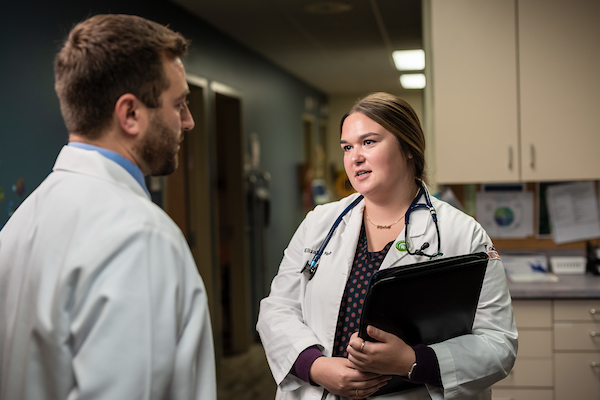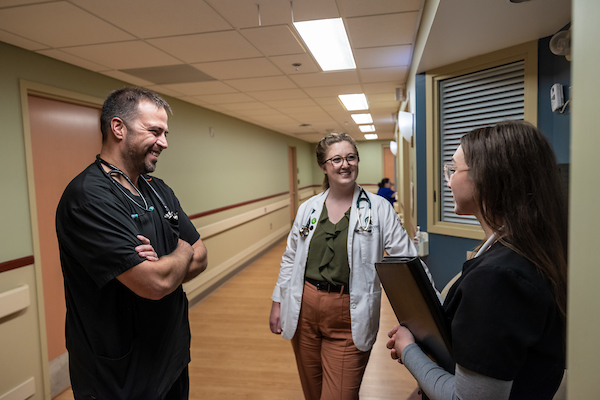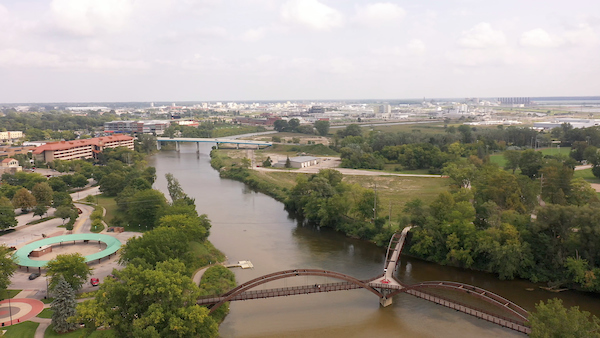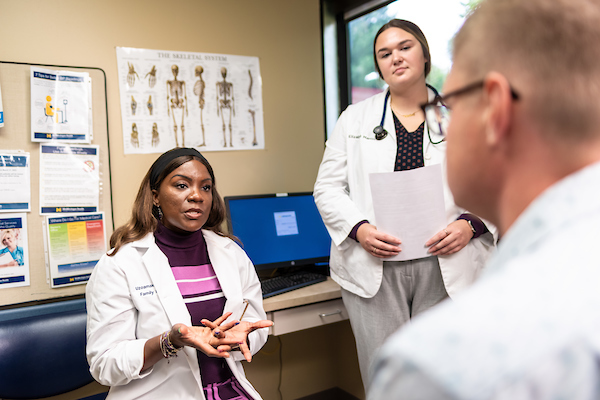Rural health students become integral members of the health care system and Midland community
July 23, 2024
 David Buzanoski, the College of Human Medicine’s community assistant dean for the Midland Regional Campus, was meeting with a medical student when a pager sounded. It was a doctor seeking help evaluating a patient suffering a possible appendicitis and asking for assistance in the surgery.
David Buzanoski, the College of Human Medicine’s community assistant dean for the Midland Regional Campus, was meeting with a medical student when a pager sounded. It was a doctor seeking help evaluating a patient suffering a possible appendicitis and asking for assistance in the surgery.
The call, however, was not for Buzanoski, MD, but for the third-year medical student.
At a larger, urban campus, a student likely would observe, but in Midland, students more often assist physicians.
“That’s the rule here, to have that direct, one-on-one experience,” Buzanoski said. “To have that level of experience in a third-year student is unique to the Leadership in Rural Medicine programs. They get a real hands-on experience.”
 The College of Human Medicine created the Leadership in Rural Medicine programs to address a shortage of physicians in the rural areas and small towns of Michigan. In the Upper Peninsula, it includes the Rural Physician Program based in Marquette. In Traverse City and Midland, it is called the Rural Community Health Program.
The College of Human Medicine created the Leadership in Rural Medicine programs to address a shortage of physicians in the rural areas and small towns of Michigan. In the Upper Peninsula, it includes the Rural Physician Program based in Marquette. In Traverse City and Midland, it is called the Rural Community Health Program.
Students enrolled in those programs spend their first two years on the East Lansing or Grand Rapids campuses and their last two in the smaller cities and towns of Northern Michigan.
Buzanoski, a specialist in internal medicine and pediatrics, understands the lure of rural medicine. He grew up on an apple farm in Maine and graduated from the College of Human Medicine in 2011 after completing his last two years in the Upper Peninsula, where he met his future wife, Kristin Busch.
 After completing their residencies, Buzanoski and Busch, MD, a colorectal surgeon, returned to Michigan, settling in Midland. The city offers many cultural attractions and most of the medical services available in larger urban areas, Buzanoski said, but “drive 20 minutes outside of Midland, and you are truly rural. One minute you’re treating a Dow executive, and, literally, the next patient is a farmer who just came into town.
After completing their residencies, Buzanoski and Busch, MD, a colorectal surgeon, returned to Michigan, settling in Midland. The city offers many cultural attractions and most of the medical services available in larger urban areas, Buzanoski said, but “drive 20 minutes outside of Midland, and you are truly rural. One minute you’re treating a Dow executive, and, literally, the next patient is a farmer who just came into town.
“I love seeing my patients out in the community,” he added. “It makes you feel you can make a difference.”
Many of the Midland students grew up in small towns and rural areas, said Julie Coe, student programs administrator in Midland, adding that “they really have an affinity for what rural communities are all about.”
The students spend about half their time in Midland, including at MyMichigan Medical Center Midland, and the rest in small-town clinics, doctor offices and hospitals in 16 small towns from the Thumb area west to Alma and north to the Straits of Mackinac. They work beside some 250 clinical faculty – physicians who teach without compensation.
 They do it “because they’re committed to education,” said Beth Swiercz, Rural Community Health program coordinator. “They love to teach. Those physicians really take the students under their wings. They’re like family to them.”
They do it “because they’re committed to education,” said Beth Swiercz, Rural Community Health program coordinator. “They love to teach. Those physicians really take the students under their wings. They’re like family to them.”
Each fourth-year student is required to identify a health care need in a community and present a way of addressing it.
In May of 2024, the Midland campus graduated 11 new doctors, who have gone on to residencies in family medicine, internal medicine, emergency medicine, psychiatry, radiology, and obstetrics gynecology. Many likely will return to the small cities and towns of Michigan.
Twelve third-year students will soon arrive at the Midland Regional Campus.
“We attract doers and not watchers,” Buzanoski said. “They’re not just shadowing doctors. We encourage them to speak up during meetings. They really become an integral part of the health care system.”

